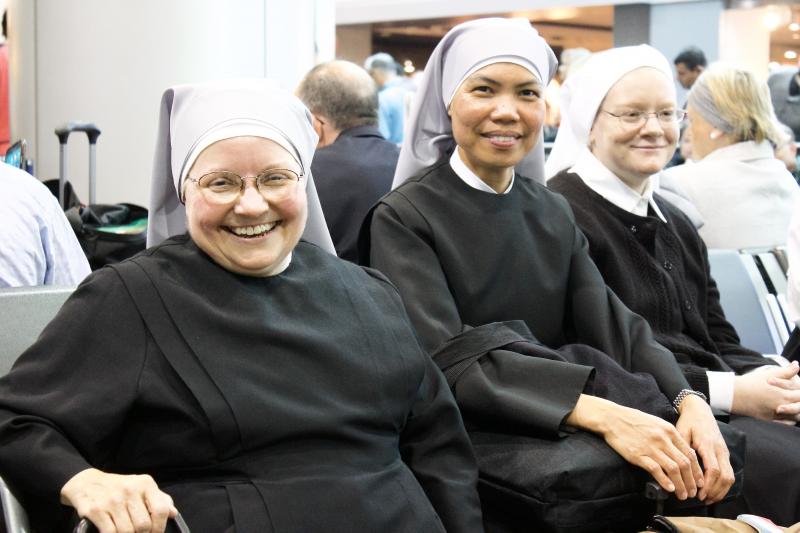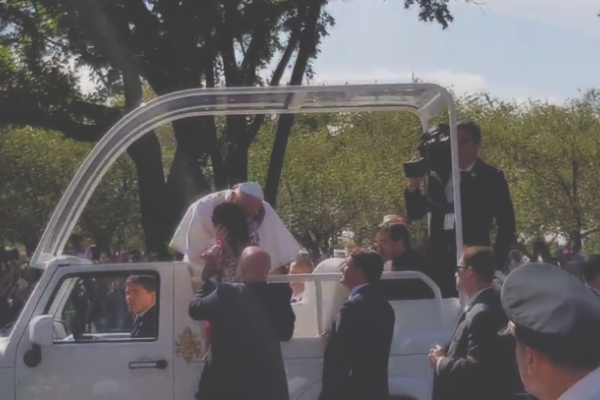“Use language what you will, you can never say anything but what you are.” —Ralph Waldo Emerson
Two years ago, when he stood on the center loggia of St. Peter’s Basilica in the Vatican to greet the world for the first time, Pope Francis spoke two simple words in Italian: “Buona sera,” or, “Good evening.”
Standing at a podium on the South Lawn at the White House Wednesday morning, the first full day of a six-day papal journey to the United States, the 78-year-old pontiff formally greeted the American public for the first time with two more simple words, this time in English:
“Good morning.”
Francis’ remarks were brief — fewer than 700 words — but poignant, telegraphing some of the most salient spiritual and social issues he intends to address during a litany of events, both public and private, in Washington, New York City, and Philadelphia before he returns to Rome on Sunday evening.
“As the son of an immigrant family, I am happy to be a guest in this country, which was largely built by such families,” the pope told a crowd of 11,000 ticketed guests at the White House.
“I look forward to these days of encounter and dialogue, in which I hope to listen to, and share, many of the hopes and dreams of the American people.”
The pontiff, who directed most of his address to President Obama, seated on the dais a few yards away, went on to mention immigration reform, climate change, and racial tensions, lauding recent efforts to “mend broken relationships and to open new doors to cooperation within our human family,” which the pope said “represent positive steps along the path of reconciliation, justice, and freedom.”
And he reminded President Obama of the words of the Rev. Martin Luther King, Jr., who famously said the United States had “defaulted” on a “promissory note” to future generations.
“Now is the time to honor it,” Pope Francis said in perfect, if halting, English.
Wednesday marked the first time we’ve heard this pope speak at length in English. It is at least his third language — his first two being Spanish and the Italian he spoke at home with his parents, who emigrated from Italy to to Argentina before he was born.
Language is a powerful medium and in his native tongue(s), Pope Francis is wonderfully articulate — poetic, even. As we listened to him speak at the White House, those of us who have followed him closely immediately noticed the uncharacteristic uneasiness with which he spoke. I couldn’t help but imagine how frustrating it must be for a man who so obviously loves language not to be able to express himself with his usual playfulness and nuance.
Some commentators have said they thought the pope looked uncomfortable, even angry as he listened to Obama’s address Wednesday on the south lawn of the White House. He sat nearly motionless with a rather dour expression. But I don’t think he was annoyed or uneasy. I think he was concentrating on understanding what the president was saying. It’s his “resting pope face,” if you will.
Reportedly, Pope Francis has spent many months boning up on his English in advance of his first visit to the United States. Learning a new language is never easy, and English can be especially challenging. Can you imagine tackling English’s implausible spelling and grammar in your late 70s?
You might pull a face, too.
Later Wednesday, the pontiff gave a passionate address in Italian to 300 Catholic bishops urging them to embrace their call to be shepherds who attend to all the needs of their diverse flock.
“I cannot ever tire of encouraging you to dialogue fearlessly,” Pope Francis told the bishops gathered at Cathedral of St. Matthew the Apostle in Washington, D.C.
He continued,
“The richer the heritage which you are called to share with parrhesia [free speech], the more eloquent should be the humility with which you should offer it. Do not be afraid to set out on that ‘exodus’ which is necessary for all authentic dialogue. Otherwise, we fail to understand the thinking of others, or to realize deep down that the brother or sister we wish to reach and redeem, with the power and the closeness of love, counts more than their positions, distant as they may be from what we hold as true and certain.
“Harsh and divisive language does not befit the tongue of a pastor, it has no place in his heart; although it may momentarily seem to win the day, only the enduring allure of goodness and love remains truly convincing.”
He ended his public day by delivering the homily at the canonization mass for St. Junipero Serra in Spanish.
Much has been made in various quarters about what Pope Francis will say during his U.S. visit. But those of us who have paid close attention to the Argentine pope since his election in 2013 know that he is at his most eloquent not in words, but in actions.
That has been true so far in Washington, where he made his earliest and perhaps clearest statement when he eschewed, as is his custom, the armored limousine and various accoutrements bestowed on visiting heads of state in favor of what has quickly become known as the “ papal Fiat.”
The pontiff might have mentioned immigration in his White House speech and other speeches Wednesday, but he said exponentially more when he ordered the Popemobile to stop on its tour of the National Mall so he could embrace 5-year-old Sophie Cruz, whom law enforcement initially had turned away after she bolted through security lines to reach him. Pope Francis spoke loud and clear again when he reportedly declined an invitation to dine with Speaker of the House John Boehner (a Catholic) and other Congressional bigwigs after his address to Congress today, opting instead to dine with — and serve lunch to— the homeless at nearby St. Patrick’s Church.
And then Wednesday night, at the end of a marathon day in the nation’s capital, after canonizing St. Junipero Serra at the National Basilica, the pope made an unscheduled, last-minute stop to visit with the Little Sisters of the Poor, a Catholic religious order dedicated to caring for the elderly. (The sisters gained notoriety for their lawsuit against the federal government over Obamacare’s contraception mandate, but reportedly the pope made no mention of it when he stopped by the Washington convent.)
IMG_4165.jpg

“It’s his actions that give credibility to what he says,” Sister Mary Richard, a nun from Queens Village, N.Y., who met “Papa Francesco” during the surprise visit, told me Thursday morning as we both waited at Union Station to board an Amtrak train bound for New York City.
She continued,
“He was exhausted but he came. He took the time to come. We take care of the elderly and he said, ‘Thank you. People just throw them away or get rid of them.’
“When he arrived the Mother Superior went out to greet him and she said, ‘Holy Father you must be so tired.’ And he said, ‘Priests and bishops get tired, but you don’t count the cost. But nuns, they never complain.’ “It’s his attitude, ya know?”
Sister Mary Richard beamed as she recalled the epic encounter last night, when the pope paid particular attention to a disabled nun who cannot speak, bending down to talk to her, bless her, and caress her face.
“Then we had an 102-year-old sister — she greeted him in Spanish, ‘Papa Francesco!’…I’m a daughter of Columbia.’ And he says, ‘Oh. You still like wine?’ She says, ‘Oh no. Cafe!’ And he [points to himself] and says, ‘Me too!’ He was so delighted,” she said.
“He’s talking to Congress right now but we know where his heart is — it’s with the poor, and that’s where he’d rather be.”
Word, sister.
Got something to say about what you're reading? We value your feedback!

